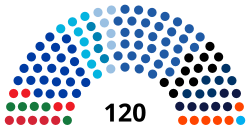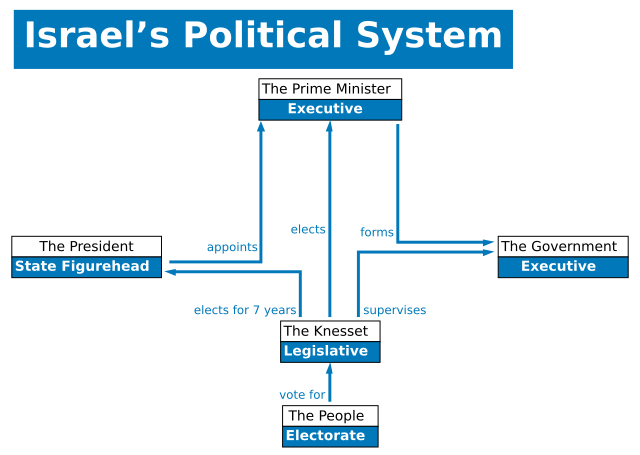
Knesset
Legislature of the State of Israel / From Wikipedia, the free encyclopedia
Dear Wikiwand AI, let's keep it short by simply answering these key questions:
Can you list the top facts and stats about Knesset?
Summarize this article for a 10 year old
The Knesset (Hebrew: הַכְּנֶסֶת, romanized: HaKnesset [haˈkneset] ⓘ lit. 'gathering, assembly', Arabic: الْكِنِيسِت, romanized: al-Kinisit) is the unicameral legislature of Israel.
The Knesset הכנסת الكنيست | |
|---|---|
| 25th Knesset | |
 | |
| Type | |
| Type | |
| Leadership | |
| Structure | |
| Seats | 120 |
 | |
Political groups | Government (64)
Opposition (56)
|
| Elections | |
| Closed list proportional representation D'Hondt method with a 3.25% electoral threshold | |
Last election | 1 November 2022 |
Next election | By 27 October 2026[2] |
| Meeting place | |
 | |
| Knesset, Givat Ram, Jerusalem | |
| Website | |
| Official website | |

The Knesset passes all laws, elects the president[3] and prime minister[4] (although the former is ceremonially appointed by the Prime Minister), approves the cabinet, and supervises the work of the government, among other things. In addition, the Knesset elects the state comptroller. It also has the power to waive the immunity of its members, remove the president and the state comptroller from office, dissolve the government in a constructive vote of no confidence, and to dissolve itself and call new elections. The prime minister may also dissolve the Knesset. However, until an election is completed, the Knesset maintains authority in its current composition.[5] The Knesset meets in Givat Ram, Jerusalem.
Members of the Knesset are elected nationwide through proportional representation.